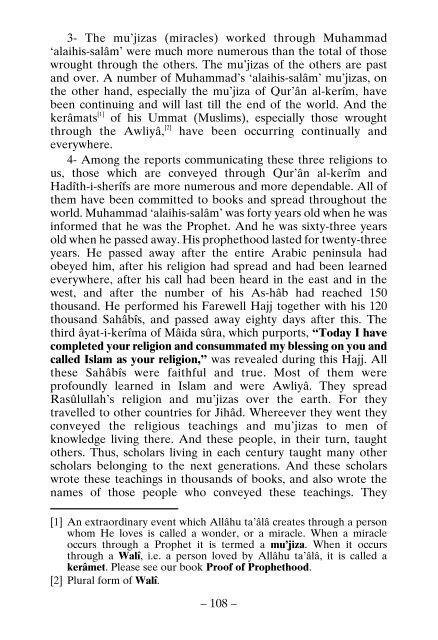Confessions Of A British Spy
Muhammad of Najd was the sort I had been looking for. For his scorn for the time’s scholars, his slighting even the (earliest) four Khalîfas, his having an independent view in understanding the Qur’ân and the Sunna were his most vulnerable points to hunt and obtain him. So different this conceited youngster was from that Ahmed Efendi who had taught me in Istanbul! That scholar, like his predecessors, was reminiscent of a mountain. No power would be able to move him. Whenever he mentioned the name of Abû Hanîfa, he would stand up, go and make an ablution. Whenever he meant to hold the book of Hadîth named he would, again, make an ablution. The Sunnîs trust this book very much. Muhammed of Najd, on the other hand, disdained Abû Hanîfa very much. He would say, “I know better than Abû Hanîfa did. In addition, according to him, half of the book of wrong.
Muhammad of Najd was the sort I had been looking for. For
his scorn for the time’s scholars, his slighting even the (earliest)
four Khalîfas, his having an independent view in understanding
the Qur’ân and the Sunna were his most vulnerable points to hunt
and obtain him. So different this conceited youngster was from
that Ahmed Efendi who had taught me in Istanbul! That scholar,
like his predecessors, was reminiscent of a mountain. No power
would be able to move him. Whenever he mentioned the name of
Abû Hanîfa, he would stand up, go and make an ablution.
Whenever he meant to hold the book of Hadîth named he would, again, make an ablution. The Sunnîs trust this book
very much.
Muhammed of Najd, on the other hand, disdained Abû Hanîfa
very much. He would say, “I know better than Abû Hanîfa did.
In addition, according to him, half of the book of wrong.
You also want an ePaper? Increase the reach of your titles
YUMPU automatically turns print PDFs into web optimized ePapers that Google loves.
3- The mu’jizas (miracles) worked through Muhammad<br />
‘alaihis-salâm’ were much more numerous than the total of those<br />
wrought through the others. The mu’jizas of the others are past<br />
and over. A number of Muhammad’s ‘alaihis-salâm’ mu’jizas, on<br />
the other hand, especially the mu’jiza of Qur’ân al-kerîm, have<br />
been continuing and will last till the end of the world. And the<br />
kerâmats [1]<br />
of his Ummat (Muslims), especially those wrought<br />
through the Awliyâ, [2]<br />
have been occurring continually and<br />
everywhere.<br />
4- Among the reports communicating these three religions to<br />
us, those which are conveyed through Qur’ân al-kerîm and<br />
Hadîth-i-sherîfs are more numerous and more dependable. All of<br />
them have been committed to books and spread throughout the<br />
world. Muhammad ‘alaihis-salâm’ was forty years old when he was<br />
informed that he was the Prophet. And he was sixty-three years<br />
old when he passed away. His prophethood lasted for twenty-three<br />
years. He passed away after the entire Arabic peninsula had<br />
obeyed him, after his religion had spread and had been learned<br />
everywhere, after his call had been heard in the east and in the<br />
west, and after the number of his As-hâb had reached 150<br />
thousand. He performed his Farewell Hajj together with his 120<br />
thousand Sahâbîs, and passed away eighty days after this. The<br />
third âyat-i-kerîma of Mâida sûra, which purports, “Today I have<br />
completed your religion and consummated my blessing on you and<br />
called Islam as your religion,” was revealed during this Hajj. All<br />
these Sahâbîs were faithful and true. Most of them were<br />
profoundly learned in Islam and were Awliyâ. They spread<br />
Rasûlullah’s religion and mu’jizas over the earth. For they<br />
travelled to other countries for Jihâd. Whereever they went they<br />
conveyed the religious teachings and mu’jizas to men of<br />
knowledge living there. And these people, in their turn, taught<br />
others. Thus, scholars living in each century taught many other<br />
scholars belonging to the next generations. And these scholars<br />
wrote these teachings in thousands of books, and also wrote the<br />
names of those people who conveyed these teachings. They<br />
[1] An extraordinary event which Allâhu ta’âlâ creates through a person<br />
whom He loves is called a wonder, or a miracle. When a miracle<br />
occurs through a Prophet it is termed a mu’jiza. When it occurs<br />
through a Walî, i.e. a person loved by Allâhu ta’âlâ, it is called a<br />
kerâmet. Please see our book Proof of Prophethood.<br />
[2] Plural form of Walî.<br />
– 108 –


